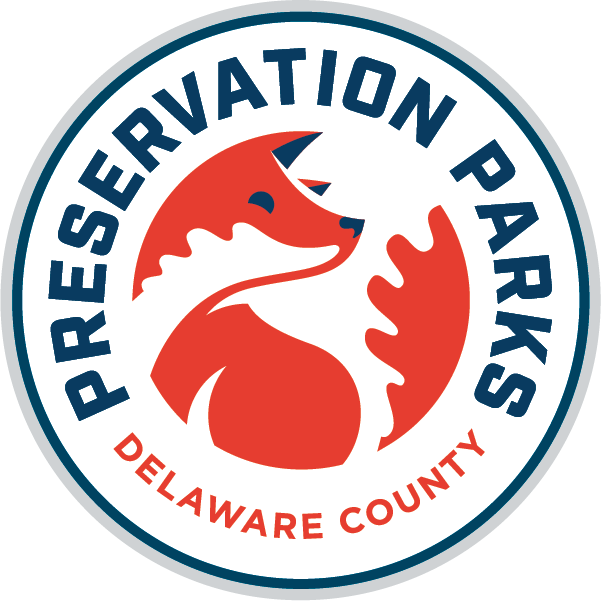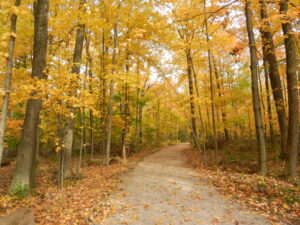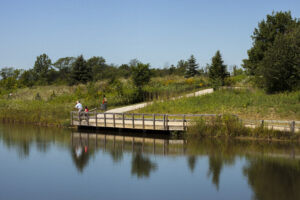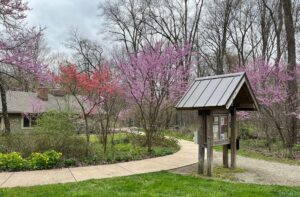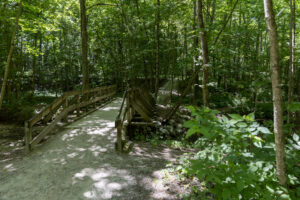By Robin Mayes, Farm Educator
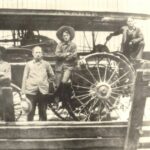
When we see some of the mammoth, sophisticated, computer-operated farm equipment moving through the fields today, it can be hard to imagine the humble beginnings from which they evolved. The first big farming machines were steam-powered and practically stationary. It wasn’t until the early decades of the 20th-century that small “gasoline traction engine” tractors began to be produced. This was due largely to the first world war. A shortage of horses and the need for increased farm production combined to propel the creation of practical tractors. Horses were in high demand to haul artillery but their average lifespan on the front was just 10 days! As Great Britain’s supply of horses wore thin, the United States supplied a significant number of horses.
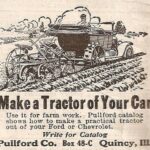
As you can imagine, farmers felt the pinch as the government enscripted horses while asking them to increase agricultural production. Tractors began to seem like the viable alternative. Henry Ford began making small Fordson tractors in 1917. There were even ways to turn your Ford Model T into a tractor.
Tractors were powerful and could pull bigger and heavier implements and do it faster than the horses and mules had. There were a few downsides though. The fuel for tractors was costly while feed for the horses could be grown on the farm. Working with a team of horses in the field was also more peaceful than with a tractor.
Another advantage to working with a team of horses or mules was their intelligence. Farm Manager, Gabe Ross and I realized this firsthand a few years ago when we were picking corn by hand at Gallant Farm. We had the wagon hooked up to our little Ford tractor. Every time we had picked all of the corn in one area, Gabe had to climb onto the tractor to pull the wagon forward a few feet. If we had a well-trained team of horses harnessed to that wagon, a simple click of the tongue or a word could have indicated to them to walk forward. Horses had almost been like another farmhand to many farmers.
More importantly in my mind is that many farmers hated to give up their horses simply because they loved them. Horses and mules probably felt like family. So often, even if one of the new-fangled tractors came to the farm, the draft teams were still used alongside the machines. Eventually, the old teams were “put out to pasture” and allowed to live out their days on the farm. As kids, my sister and I made friends with the elderly couple who lived on the farm north of ours. We sometimes spent a cold, winter afternoon sitting in their warm parlor sipping tea with Mrs. Bumgartner while she crocheted. After tea, we would find Mr. Bumgartner out in the small barn across the road. He might be mending harness or tossing hay down from the loft and talking to the old horse who occupied one of the stalls. I can’t recall the huge workhorse’s name but I remember sitting astride his broad, brown back as he munched hay. He occupied that stall and the small adjoining pasture the rest of his life.
In the early days of Gallant Farm, we were planning a Plow Day. A local farmer, renowned for his work with his Belgian draft horse team, brought them to the farm to prepare for the event. Those majestic animals were so well-trained that he did not even keep tethers on them. He simply opened the doors of the trailer and they backed out and dociley walked around to the side and waited to be harnessed to the plow.
My dad often talked of the “matched set” of black mules his grandfather had farmed with when he was a boy. In fact, it was Grandpa Dunnan and those mules that had first inspired Dad to be a farmer. But, by the time Dad began farming “on the G.I. Bill” after World War II, tractors were the norm. He started with an old Farmall he had gotten second-hand. Eventually, he acquired a second, newer Farmall. Those two older tractors served Dad well for many years until he had saved enough to buy a new one. A trailer pulled into the barnyard one spring day with a shiny new John Deere 3010 onboard. Wow! We were really going to farm now!
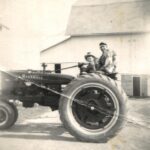
We all marveled at the new machine and Dad was so anxious to begin using it! And those big, wide fenders over the tires meant I could easily ride along. Of course, my siblings and I had all spent time on the tractors with Dad previously. Not considered a safe practice today, of course, but as small children, we often rode on Dad’s lap as he drove.
I remember many an hour spent riding on the wide, flared fender of that John Deere. The air was dry and dusty and the tractor engine loud, but there was no where else I wanted to be more than sitting on that hot metal fender with my feet braced against the seat Dad was sitting in as he navigated our way around and around a field. If we were plowing or discing, the smell of upturned earth was a treat. And as we cut in close to the treeline, there was that faint ‘green’ scent of early spring. As the tractor reached the south end of the property where the Scioto River ran past I could catch a glimpse of the water glinting through the tree leaves. Sometimes we might even pause work long enough to climb down from the tractor to send stones skipping across.
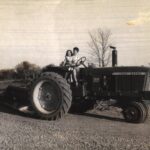
Within a few weeks of his getting that new John Deere, the 1965 Palm Sunday tornado came through our farm, destroying the barn and all of the out-buildings. The prized tractor that had been parked inside the implement shed was now sitting in front of the rubble that had been the garage. Amazingly enough, the only damage the tractor had sustained during the flight from the inside of the now missing shed to the spot where it came to rest, was a twisted brake pedal. That tractor then proved invaluable in the weeks of clean-up of the damage from that twister.
I have always been a little disappointed that my older siblings had all helped Dad in the fields, driving tractors and trucks, hauling grain wagons and baling hay. By the time I was old enough to actually help, Dad was doing more manufacturing of farm implements than farming and my help in the fields was not needed. Happily, I get plenty of opportunities to “help in the fields” here at Gallant Farm, though!
If you are interested in these machines that transformed farming, come to Gallant Farm June 18 when the Delaware County Antique Farm Machinery Association members bring out their tractors to share. The Buckey Valley FFA Alumni Association will also be on hand from 11 am to 1 pm that day to host a kiddie pedal tractor pull so bring your little farmers out to test their pedal power!
